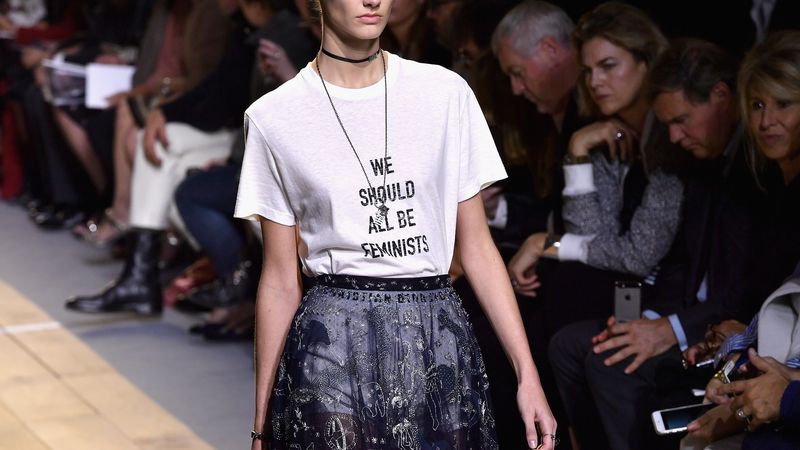At one point, we’ve all been swayed by the anti-ad technique within popular media, in which marketing happens through a seemingly innocuous and even charming lens of social progress and equality. Recently, Dove India ran a feminist campaign under the pretense of #LetsBreakTheRulesOfBeauty, which celebrated inclusivity and the reclaiming of the female body. It contained wholesome depictions of diverse women, poignant testimonials, winsome music, all of which had viewers more hopeful and trusting in the integrity of large corporations.
This isn’t to imply that Dove is not truly advocating for body positivity, but rather that the language we use to push feminism can often do more harm than good – like erasure of minorities. Most pursuits to universalise feminism are ironically led by only a certain class of women, and thereby only appeal to this demographic once publicised. Perhaps the most damaging is how contemporary and consumerist feminism packages the construct of gender, nearly always suggesting that the product in question is a symbol of the ideal empowered female.
Also read: Un-Fair And Not So Lovely: Capitalism And Colourism In India
Jessa Crispin, author of the bluntly-written Why I Am Not a Feminist: A Feminist Manifesto, mourns the loss of political undercurrents and ambition from the movement and says, “It used to be a way of imagining a different kind of culture. But somehow in the last 10 years or so, feminism became another part of the culture; it became as vapid and selfish as everything else.”
As systems that feed off each other, patriarchy and capitalism are rarely understood in their full scope, one that is exploitative and self-serving. The last two years have witnessed a shallow popularisation of feminism led by beauty and clothing companies that are cashing in on phrases like “The future is female” and “Girls just wanna have fun-damental rights” – obviously, there’s nothing wrong with these taglines themselves, but rather that they paint a quirky face over a gross imbalance in power dynamics.
In 2017, Dior began selling a plain-white cotton “We should all be feminists” t-shirt that retails for an unreasonable $710, but began trending when it appeared on singer Rihanna’s Instagram. This tells us that, yes, everyone should be a feminist – but only those who can afford it. Another instance of the unavoidable hypocrisy of capitalism co-opting feminism is the allegation that feminist t-shirts sold by campaign group The Fawcett Society are being produced by underpaid women in a dismal Mauritian sweatshop.
Feminist t-shirts sold by campaign group The Fawcett Society are being produced by underpaid women in a dismal Mauritian sweatshop.
It’s an uncomfortable reminder that the easy-to-digest feminism we regularly embrace can sometimes be at the cost of unrepresented marginalised groups. What a 22 year old in the city considers progressive or ‘woke’, might directly conflict with the needs of an unpaid single mother in the outskirts. Although wearing cute feminist sweaters does reflect good intentions and a show of sisterhood, the urgency and stakes of today’s political climate cannot remain a footnote of everyday conversation.
Crispin considers mainstream feminism stagnant and unchallenging, branding it the “You go girl self-empowerment version of feminism, which has nothing to do with progress.” Almost a year ago, Dove released a set of ‘Real Beauty Bottles’ to stay in tune with their body-positive brand – these were body-wash bottles roughly moulded into female bodies, from tall and sleek to short and pear-shaped.
The bottles are a flimsy attempt at empowerment that distracts from tangible matters of equality, because women aren’t interested in products shaped like our bodies (and are probably hard to hold), but need international spaces to accurately represent us and systemic misogyny.
Multimedia platforms that lean on social agendas sell the idea that minorities must individually shift their attitude in order to be liberated.
Instead of rejecting existing power structures and their oppressive patterns, multimedia platforms that lean on social agendas sell the idea that minorities must individually shift their attitude in order to be liberated. When we place the responsibility of undoing years of prejudice on a victim, complacently asking them to be brave or confident, the system that first took away their autonomy and strength is rewarded.
It’s safe to say that a capitalist society afraid of confrontation and political-incorrectness has fabricated several imposters of feminism in recent years, each version more watered-down and grasping than the last. The movement was originally born of a refreshing defiance by writers, artists, and thinkers, but has petered out into a bland system of internalised misogyny which believes that equality is absorbing more women into patriarchal corporate structures, as opposed to ridding the toxic culture of the workplace itself.
Also read: Dear Indian Brands, Pinkwashing Does Not Equal To Allyship
As Crispin puts it, “If you have women in positions of power behaving like men do, that is not a defeat of the patriarchy… That’s just patriarchy with women in it.” CEOs and advertisements can no longer be looked to as references for how to navigate the world. To revive an anti-capitalist dynamic within popular feminism, we have to return to our roots of political hunger and remind ourselves that it is okay to access justified rage.
Reference
1. Duke University Press
2. Vox
3. New Yorker
4. Mic
5. The Guardian
Featured Image Source: Mic




